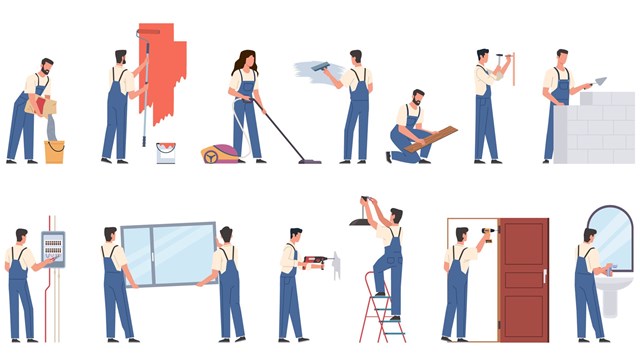
One might assume that the insurance policies carried by a building would cover any mishaps that would affect residents. This, however, is a misconception. A co-op corporation or condo association takes responsibility for the structural aspects of the building. They are also responsible for the common areas of the building, including the lobby, hallways, stairs, elevators, and other areas shared by the building’s occupants. However, "every [co-op or condo] owner needs to have their own insurance," states David L. Mittleman, a principal at The Oberman Companies, an insurance brokerage firm in White Plains, New York. An apartment dweller needs insurance as much as any homeowner.
Unit owners themselves are basically responsible for everything visible inside of their apartments, including wall coverings, tile, pipes and plumbing within the unit–virtually everything that the eye can see. If there is damage to any furnishings, fixtures, walls, or flooring of the apartment, it is the responsibility of the occupant to provide an appropriate remedy for the problem.
The Necessity for Personal Coverage
Although co-op and condo owners alike are responsible for the upkeep of their apartments, many boards do not presently mandate personal insurance coverage. This can cause some very serious problems should building occupants suffer damage to their apartments at the hand of a fellow tenant or any natural disaster. Robert Mackoul, president of Mackoul & Associates, an insurance brokerage firm in Manhattan, recalls a particularly disastrous incident involving a building on the Upper East Side in August 1999. There had been a rain storm that resulted in over seven inches of rain. Prior to the storm, the penthouse occupant covered the drainage pipes on the top of the building for cosmetic reasons. This act caused the water to seep down into the building. Two apartments downstairs were literally destroyed; the residents had to live in hotels for over eight months. While other apartment owners were able to stay in place, they too had extensive damage, some to the extent of $15,000 to $20,000. In total, the result was several hundred thousand dollars worth of repairs. Needless to say, this situation led to a lot of finger-pointing as to who was at fault.
Unfortunately, neither destroyed apartment was sufficiently covered. What’s the insurance-related recourse in a situation? Theoretically, if one occupant was found to be at fault, their insurance would likely cover their damage and the damage to their neighbors. However, Mackoul says that situations like this are never resolved quickly or without hitches. The owners of the two destroyed apartments are now suing the penthouse owner but paybacks won’t come any time soon. Mackoul says, "This will drag on in litigation for years and years." The moral of the story: Make sure you have your own personal coverage, that it’s up-to-date and adequate!
Arthur A. Schwartz, president of Masters Coverage Corp., an insurance brokerage agency in Manhattan, reiterates, "It’s to the benefit of all shareholders to carry their own individual insurance." As with the storm scenario, anyone without adequate insurance coverage or none at all would have to replace all of their damaged possessions out of their own pockets. In addition, they would have to pay for any repairs that the co-op or condo didn’t cover. Even if another owner is eventually found to be at fault, you’ll have to cover yourself in the interim.
Policy Differences
The insurance coverage available to co-op and condo owners is similar to that of the average homeowner, covering theft, fire, flood, and personal items. Exceptionally valued items would be covered outside of the basic policy. In addition, a person can opt to purchase insurance to cover themselves and their belongings outside of their homes. This is referred to as "off premises" coverage. For example, golf clubs stolen from the trunk of one’s car would be covered under this option.
Unlike the average homeowner, co-op and condo owners are encouraged to purchase insurance known as "additions and alterations" coverage, and "loss assessment" coverage. Schwartz explains, "Additions and alterations insurance covers damage to any additions or improvements made to an apartment, including wallpaper, carpeting, cabinets, countertops, appliances, or any other improvements made to the apartment by the occupant." This is very important because the co-op corporation is only responsible to replace what was originally in the apartment if they were at fault for any damage. For example, if a unit dweller suffers damage to their newly installed marble floor from a leak from the common area corridor, the corporation is only responsible for replacing the original floor, not the new floor. An "additions and alterations" policy would cover the cost to replace the marble.
Schwartz advises that when any insured unit owner decides to make any improvements or alterations to their apartment, they notify their insurance carrier so that they can revise their policy to include the addition. Revising the policy is also recommended if a tenant makes a large purchase for use within the home like a new appliance or computer.
In the storm scenario, the first apartment owner had adequate coverage for their personal property, but not nearly enough for improvements and alterations nor for loss of use. This means they had to foot the bill for everything they had altered in their apartment–like their brand new $50,000 kitchen–and for their living expenses in the hotel for eight months.
The second apartment owners had adequate coverage for personal property and living off the premises, but not enough for improvements and alterations. According to Mackoul, "Those two apartments had to be completely gutted and started from scratch. The buildings insurance paid for a lot but the owners will have to pay for all the extras, like wallpaper, built-ins, customized flooring. . .it goes on and on."
Loss assessment coverage is standard in most co-op and condo policies. In the event that the entire building suffers a disaster, each owner can be held financially responsible for a portion of the damage. This often occurs if the building does not have sufficient insurance to cover the repair of the damages. If a building suffers $100,000 worth of damage, and their master policy covers $90,000 of the damage, the shareholders may be assessed the remaining $10,000. Schwartz explains, "This amount would be split among the unit occupants." Those occupants with insurance would likely have this covered under their individual policies. Those without it would have to pay the cost out-of-pocket. Shareholders are sometimes assessed the deductable that the master policy of the building carries.
"It’s an overwhelming task [for boards] to stay on top of people with no insurance," admits Philip S. Bilelo, a principal of Total Management Corp., an insurance brokerage firm in Malverne, New York. Bilelo says it’s a very common problem that many people who suffer damage to their units have no coverage or inadequate coverage. And because most boards don’t mandate insurance, many people are not protected and have substantial losses when disaster strikes.
Requiring Personal Coverage
Mittleman and others have noticed a new trend: Some boards are beginning to modify bylaws and house rules to prevent damage to the buildings master insurance policy. "Condo associations and co-op boards are amending the rules to require all shareholders to carry their own insurance," Mittleman says. If all of the tenants in a particular dwelling have adequate personal insurance coverage, Mittleman believes it takes some of the burden off of the building’s insurance company when disasters occur. Because individuals have their own coverage, they don’t have to rely on the corporation’s insurance carrier to help repair any damages to their unit.
The cost of the master policy may be reduced if many of the occupants have personal insurance–and the maintenance costs are kept down as a result. Therefore, personal insurance not only protects the individual, it protects everyone in the building.
There is no rule of thumb as to how much insurance a co-op or condo owner should carry. Although the building master policy will take care of some damages, coverage is very limited. Each individual has to carefully consider the value of what is within their dwelling and insure accordingly, advises Rick Insley, an agent with Liberty Mutual, an insurance company in Manhattan.
"A shareholder can purchase insurance for as little as $175 to $350 yearly although this is a very basic policy," states Schwartz. Mittleman estimates that the average two-bedroom, two-bath apartment in Manhattan would cost $800 yearly to insure adequately. Expensive jewelry, priceless collectables, heirlooms, and expensive electronics would be an additional cost to a policy.
In this new millennium with home business growth, and investment-savvy consumers, it makes sense that all people should be mindful to protect all that they have. Today’s co-op and condo owners would be hard-pressed to allow their valuables to go unprotected. Personal insurance is a necessary option to protect their investments.
Ms. Terrell-Ernest is a freelance writer living in Queens.






Leave a Comment